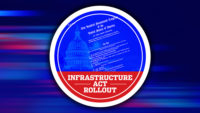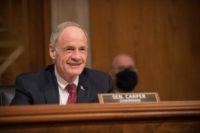The House Transportation and Infrastructure Committee’s new Chairman, Rep. Sam Graves (R-Mo.), foresees a busy to-do list in the coming months. “We have an aggressive agenda ahead of us,” he said on Feb. 1, at the committee’s first public session of the 118th Congress—a combination of an organizational meeting and a hearing on infrastructure and supply chain issues. [View video of hearing here.]
On the legislative front, Graves listed a reauthorization of Federal Aviation Administration programs—including FAA’s airport infrastructure grants—plus a pipeline safety bill, Coast Guard reauthorization and a Water Resources Development Act, to fund Army Corps of Engineers civil works projects.
Oversight of federal programs will be another key committee focus, the hearing indicated. Unsurprisingly, a key topic was the implementation of the 2021 Infrastructure Investment and Jobs Act.
Graves noted that he did not vote for the $1.2-trillion legislation but said, "I do accept that it is now the law of the land.”
He also said that the committee must “ensure that the money from the IIJA is spent responsibly and is directed toward making our nation’s supply chain more efficient and more resilient.”
FHWA Highway Memo
Witnesses and lawmakers at the hearing brought up a 2021 Federal Highway Administration guidance document dealing with priorities for using IIJA highway and bridge funds that for months has been a flashpoint for Republicans and other critics.
Chris Spear, the American Trucking Association's president and chief executive officer, said the FHWA memo favors using funds for work on existing highways and bridges over construction projects to add capacity. Spear said that policy “does nothing to address congestion, improve safety and reduce emissions."
But Rep Rick Larsen (Wash.), the committee's top Democrat, cited FHWA statistics indicating that IIJA funding for capacity-adding projects has been rising.
He said that in fiscal 2021, the IIJA's first year, $8.1 billion went for projects for highway expansion or reducing congestion. In fiscal 2022, Larsen said, the total for those types of projects was 25% higher.
He added that the numbers do not indicate that the FHWA memo had much of an impact, or any impact, on states' abilities to fund capacity-expansion projects. "I will say the jury is still out" on the effect of the guidance document, Larsen added.
Speer called the FHWA statistics "encouraging." But he added, "Why have the memo at all?"
Inflation Impact
Another witness, Jeff Firth, a vice president at Hamilton Construction Co., Springfield, Ore., said that “inflation and supply-chain constraints have threatened the success of the IIJA."
Firth, who spoke on behalf of the Associated General Contractors of America, also said that with the long lead times for projects, contractors are not able to predict the prices and availability of materials.
He pointed to uncertainties about the IIJA's Buy America provisions. He said, “There’s still significant confusion among industry, federal, state and local agencies regarding the difference between a product categorized as a 'construction material' or a 'manufactured product.' "for Buy America purposes.
In addition, Firth voiced support for "streamlining" the federal permitting process for infrastructure projects. He said, "The projects all start with permits, and for us, that's where our biggest bottleneck is."
Nevertheless, Firth said, if there had been no IIJA, the volume of transportation infrastructure projects would probably be 20% to 30% less than it is now.
Port Dredging
Another witness, Roger Guenther, executive director of Port Houston, said Houston Ship Channel operations and maintenance dredging has been underfunded by 50% to 60% of what is needed. He said that several other U.S. ports have received federal funding for dredging projects “and adding the Port of Houston to that list would have an enormous positive impact on the nation;s economy.”
He said the Ship Channel is authorized to operate at a depth of 45 ft. But because of silting, the draft levels for ships in the channel are about to be restricted, probably as early as March.
Graves, who was named committee chairman in the wake of Republicans’ winning the House majority in November, also struck some bipartisan notes at the meeting and hearing, particularly in referring to Larsen. Graves also stated that the panel will be “a work committee, not a ‘show’ committee."






Post a comment to this article
Report Abusive Comment